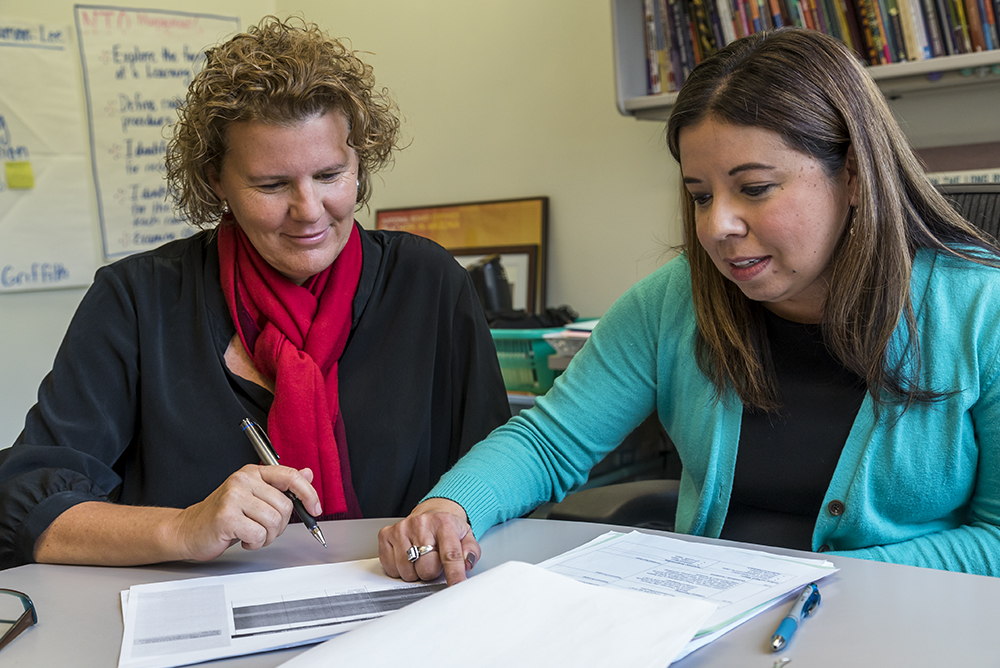March 1, 2016
Arizona Districts Carve Pathways to Leadership
Placing teachers in critical roles advances educational leadership.
In a perfect world, shifting the culture of education and defining teacher leadership would be simple. But, the reality is there’s no Pinterest recipe or Teachers Pay Teachers lesson plan to make these things happen overnight.
In an effort to support current and future educational leaders, the National Board for Professional Teaching Standards (National Board) uses grant monies from the U.S. Department of Education to drive the Network to Transform Teaching. Rather than trying to get every teacher in the country to join the movement, the National Board concentrates their energies on opportunities for change at targeted schools and districts.
Fortunately, in 2014, Arizona was selected as one of the six focus sites. Since then, Network to Transform Teaching has advanced and further established a mission. With the help of the Arizona K12 Center, local districts will work to accomplish three goals, along with the other five sites to: increase the number of candidates submitting their first National Board Certification component; grow the percentage of National Board Certified Teachers in instructional leadership roles; and infuse Board-certified teachers as leaders in mentoring and induction programs.
Board-certified teacher Daniela Robles is the Teacher Retention and Professional Development Coordinator in the Balsz Elementary School District. She also sits on the board of directors for the National Board and the Arizona K12 Center. The Arizona educator says the objective of Network to Transform Teaching is to redefine what it means to be a teacher in today’s society, transforming the teacher continuum into a circle, rather than a path with a culmination point.
“The vision of our past president, Ron Thorpe, was to bring National Board Certification to scale. When he articulated that vision, it prompted thought around making Board certification something you simply pursue after completing an induction program and your third year of teaching. We want accomplished teaching to become a part of pre-service and teacher preparation. Let’s change the ethos, or the way we think about accomplished teaching, so that it’s embedded before a teacher walks into a classroom for the first time,” Robles explains.
While it’s easier said than done, the Balsz Elementary School District uses the Network to Transform Teaching initiative as a model and reaps the rewards. The district places Board-certified teachers in formal mentor roles, providing sustained support for novice teachers.
Jan Mains is a Board-certified teacher and an Arizona Master Teacher in the Balsz Elementary School District. She believes pairing Board-certified teachers and new teachers sets up all district stakeholders for success, including students.
“We almost lost a new teacher because she was overwhelmed. I went into her classroom for several weeks to support her learning community and provide instructional strategies. I also helped her infuse creative ideas to access the curriculum and standards, which helped her get on the right track. Being a mentor teacher comes down to building strong relationships with your teachers so they can ask you anything. They should know you think they’re great by showing them you support their learning, which reveals your desire for them to be successful,” Mains says.
Robles claims the provision of the National Board and the Arizona K12 Center will increase teacher retention. Because Arizona is in the midst of a teacher shortage, increasing self-efficacy in educators is critical.
According to Jason Hammond, the Director of Human Resources for the Phoenix Elementary School District, the time is ‘now’ to focus on teacher retention.
“The entire purpose of Network to Transform Teaching will help us with retention. When you go through a program with your peers, be it a mentor program or National Board Certification, you develop relationships and a support network,” Hammond, a doctoral student at Northern Arizona University, says. “When the going gets tough, people rely on their support systems to make it through.”
After gaining support from the district superintendent and school board, the Phoenix Elementary School District recently committed to being a focus site in the Network to Transform Teaching initiative. The district, which has 14 schools, joins the Maricopa Unified School District and Balsz Elementary School District for the 2016–2017 school year, and will receive grant monies to support those seeking certification.
“What I love about our partnership with the Arizona K12 Center is that it makes our plans sustainable,” explains Dr. Angel Jannasch-Pennell, a Phoenix Elementary School District Board Member. “Plus, with Jason’s enthusiasm, he’s not going to let it die.”
Recently, about 30 individuals from the Phoenix Elementary School District completed a National Board pre-candidacy class, which is a precursor to declaring candidacy. In addition to receiving financial assistance to pay for each component, Hammond explains Board certified teachers in the Phoenix Elementary School District earn a $2,500 stipend each year.
“We’re so excited to be a part of the grant because we want to keep this momentum going. We want to nurture and foster it so that we can transform the culture of the district,” Hammond says. “It’s exciting to think about what the district will be like when we have 30, 60 … and even more National Board Certified Teachers.”
Learn more about National Board candidate support through the Arizona K12 Center.











